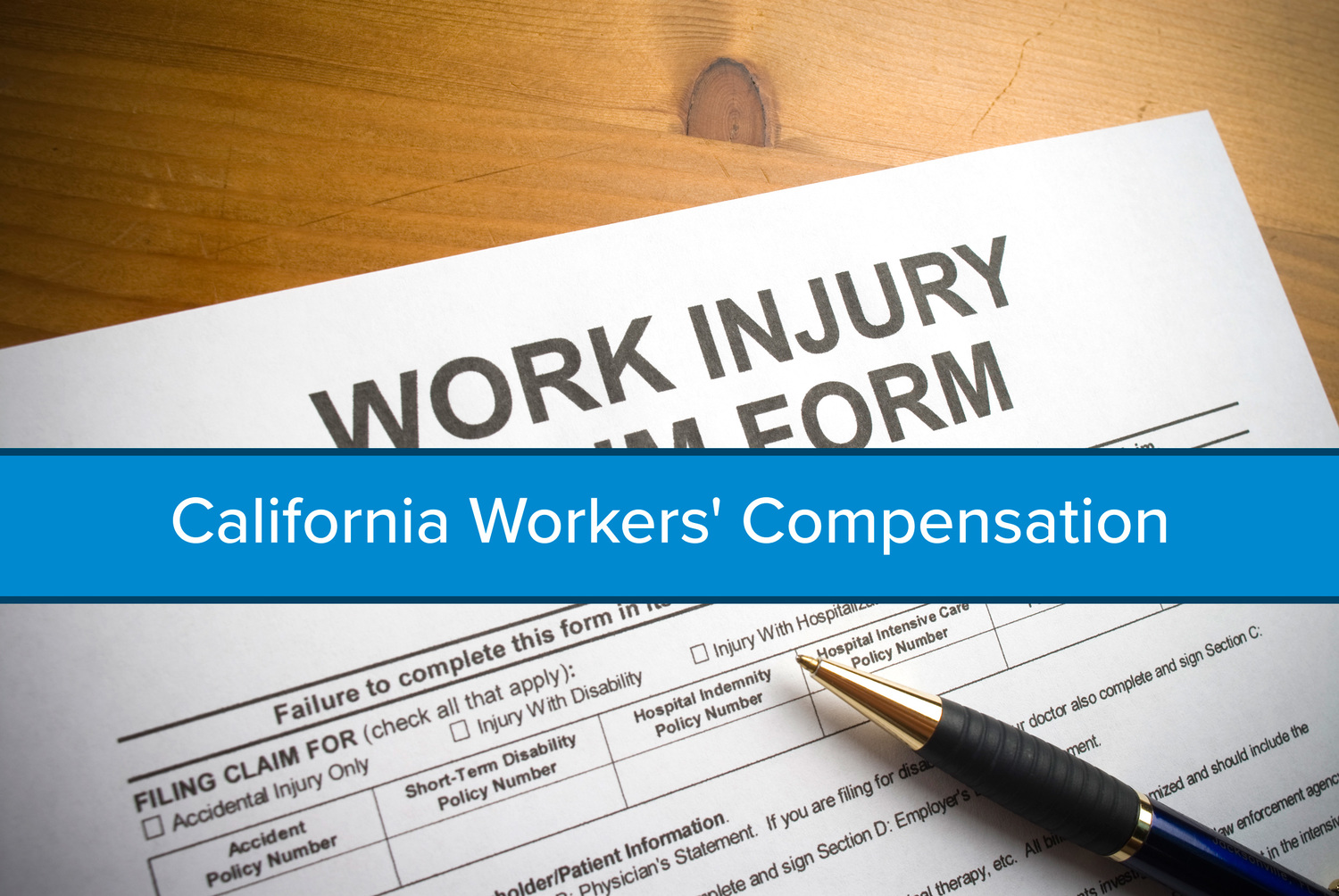
Workers’ compensation is a system of no-fault insurance that provides medical and monetary benefits to employees (or their survivors) for work-related injuries, diseases and deaths. Workers’ compensation is governed by state law.
In California, the state Workers’ Compensation Act (WCA) outlines who is eligible to receive workers’ compensation benefits. The California Division of Workers’ Compensation (DWC) resolves any disputes regarding eligibility under the WCA.
In general, a person qualifies for workers’ compensation benefits if he or she meets the WCA’s definition of a covered employee and sustains a compensable condition.
STATE RESOURCES
California Division of Workers’ Compensation (DWC) website
Workplace Poster: Employers may use this WCA notice to satisfy their posting obligations.
Guidebook for Injured Workers: The DIR has published this guide to help employees understand their rights and obligations under the WCA.
First Reports of Injury: Employers must report employees’ work-related conditions using Form DWC 1 and Form DLSR 5020.
COVERED EMPLOYEES
Most workers are covered under the WCA. The WCA defines an employee as any person rendering service for an employer. Employment may be by appointment, contract or as an apprentice. Conditions for employment may be expressed, implied, written, verbal, lawful or unlawful. Within this broad definition, the WCA specifically includes the following as covered employees:
- Aliens and minors;
- All elected and appointed paid public officers;
- Domestic workers (unless an exception applies);
- Inmates of state penal or correctional institutions while engaged in assigned or contractual employment;
- Working members of a partnership or limited liability corporation (LLC) that receive wages irrespective of profits (though general partners and managers may have to elect coverage first);
- Any person whose employment training is arranged by the State Department of Rehabilitation with any employer;
- Certain individuals who work under a contract or commission for the creation of a work of authorship; and
- Officers and members of boards of directors of quasi-public and private corporations while rendering service for pay for the corporations.
As of Jan. 1, 2017, covered employees also include the following:
- Sole shareholders of a corporation;
- General partners of a partnership; and
- Managing members of an LLC.
Under a prior version of the WCA (in effect through Dec. 31, 2016) the individuals listed above were not considered covered employees unless they voluntarily elected to provide coverage for themselves and filed an election notice with the DWC. Under the law in effect beginning Jan. 1, 2017, all of these individuals are automatically covered. However, some of them may voluntarily exclude themselves from coverage, as discussed later in this document.
As of July 1, 2018, covered employees also include any person who holds the power to revoke a trust that includes shares of a private corporation or interests of a general partnership or LLC.
STATUTORY ExcLUSIONS
Certain types of workers are excluded from the WCA’s definition of a covered employee. Among others, employers are not required to provide coverage for:
- Workers engaged in interstate commerce or otherwise subject to federal workers’ compensation laws;
- Independent contractors;
- Certain individuals who officiate or participate in sports or athletic events;
- Domestic workers who earn less than $100 in the 90-day period immediately preceding an injury;
- Individuals performing services in return for aid or sustenance only from religious, charitable or relief organizations;
- Off-duty ski lift operators and voluntary ski patrol workers; or
- Certain volunteer workers receiving no more than meals, lodging, use of the organization’s facilities or reimbursement for incidental expenses as compensation.
Effective July 1, 2018, corporate officers and directors of a cooperative corporation are also excluded from the WCA’s definition of a covered employee.
Most excluded individuals may come to an agreement with their employers to receive coverage and waive the exception that applies to them. An employer that agrees to extend coverage to employees who are not otherwise covered by the WCA must file a notice of acceptance with the DWC. The notice of acceptance subjects the employer to WCA provisions for one year. If an employer wishes to terminate this election within the one-year period, it must file a notice of withdrawal with the DWC.
Voluntary Exclusions
As of Jan. 1, 2017, the following may voluntarily elect to exclude themselves from coverage:
- Corporate officers and directors of quasi-public and private corporations who own at least 15 percent of the issued and outstanding stock of the corporation;
- General partners of a partnership; and
- Managing members of an LLC.
Effective July 1, 2018, the following also have the right to exclude themselves from coverage:
- Corporate officers and directors of quasi-public and private corporations who own at least:
- 10 percent of the issued and outstanding stock of the corporation; or
- 1 percent of the issued and outstanding stock of the corporation, if they:
- Have a parent, grandparent, sibling, spouse or child who owns at least 10 percent of the issued and outstanding stock of the corporation; and
- Are covered by a health care service plan or a health insurance policy through the corporation;
- Professional corporation owners who are practitioners rendering the professional services for which the professional corporation is organized.
If an individual is allowed to exclude him- or herself from coverage under these new WCA provisions, he or she may do so by executing a written waiver of his or her rights under the WCA and including a written statement, under penalty of perjury, certifying that he or she qualifies for the exclusion under the law. This waiver becomes effective as soon as the employer’s insurance carrier accepts it, and the exclusion from coverage remains in effect until the excluded individual provides the insurance carrier with a written withdrawal of the waiver. The table below provides a side-by-side comparison to summarize the voluntary exclusion changes.
| Class of workers | Corporate officers and directors | Practitioner-owners | Working partners/members | |
| Type of business | Private and quasi-public corporations | Cooperative corporations | Professional corporations | Partnerships and LLCs |
| Until
Dec. 31, 2016 |
Sole shareholders not covered unless they elect coverage | Automatically covered and not allowed to exclude themselves | General partners and managing members not covered unless they elect coverage | |
| As of
Jan. 1, 2017 |
All automatically covered, but those who own at least 15 percent of the issued and outstanding stock may elect to exclude themselves from coverage | All automatically covered, but general partners and managing members may elect to exclude themselves from coverage | ||
| As of
July 1, 2018 |
All automatically covered, but the following may elect to exclude themselves from coverage:
• Those who own at least 10 percent of the issued and outstanding stock; and • Those who own at least 1 percent of the issued and outstanding stock of the corporation, if a family member owns at least 10 percent and they have health care coverage. |
Automatically covered but may elect to exclude if they have health care coverage or disability coverage that is comparable to WCA coverage. | Automatically covered but may elect to exclude themselves from coverage | |
Extraterritorial Coverage
Individuals who have been hired or who are regularly employed in California are covered under the WCA when they sustain a compensable condition outside of the state. Individuals hired outside of California but performing work in the state are exempt from WCA provisions if they are covered by the laws of another state.
COMPENSABLE CONDITIONS
In general, a work-related condition is compensable if it:
- Arises out of and in the course of a covered employee’s employment; and
- Causes disability from work or the need for medical treatment.
A compensable condition can be specific or cumulative. A specific injury is a condition that results from one incident or exposure. A cumulative injury is a condition caused by repeated incidents or exposure extending over a period of time.
While most compensable conditions are physical in nature, a psychiatric condition may be compensable if specific requirements are met. Among these requirements, an employee must be able to demonstrate that work events or conditions were a predominant or substantial cause (at least 35 to 40 percent of the cause) of a psychiatric condition.
Exceptions
Under the WCA, a condition is not compensable if it was caused by the employee’s:
- Willful intention to injure himself, herself or another;
- Participation in a physical altercation that was initiated by the employee;
- Commission of a felony;
- Commission of certain misdemeanors for which he or she has been convicted; or
- Intoxication by alcohol or unlawful use of a controlled substance, as defined in California’s Health and Safety Code.
In addition, injuries that occur during recreational and social activities are not compensable unless the employee’s participation in the activities was mandatory.
ADDITIONAL EMPLOYEE RESPONSIBILITIES
The WCA sets additional employee expectations and responsibilities. Failing to satisfy these requirements may cause an individual to lose benefits he or she may have otherwise been entitled to receive. Among the duties, employees are expected to:
- Inform a supervisor or manager of work-related conditions as soon as possible, but no later than 30 days of when they happen;
- Report for treatment at a health care provider approved by their employers (unless they require urgent medical care at the nearest health care facility);
- Submit to the employer’s written requests for medical examinations; and
- File a claim with the DWC within one year after an injury or accrual of the right to WCA benefits.
MORE INFORMATION
Please visit the DWC website or contact Stephanie Johns at Lipscomb & Pitts Insurance, LLC for more information on workers’ compensation laws in California.
Stephanie Johns, CIC, CISR
Vice President / Member of the LLC
Lipscomb & Pitts Insurance, LLC
Tel: (901) 321-1000



